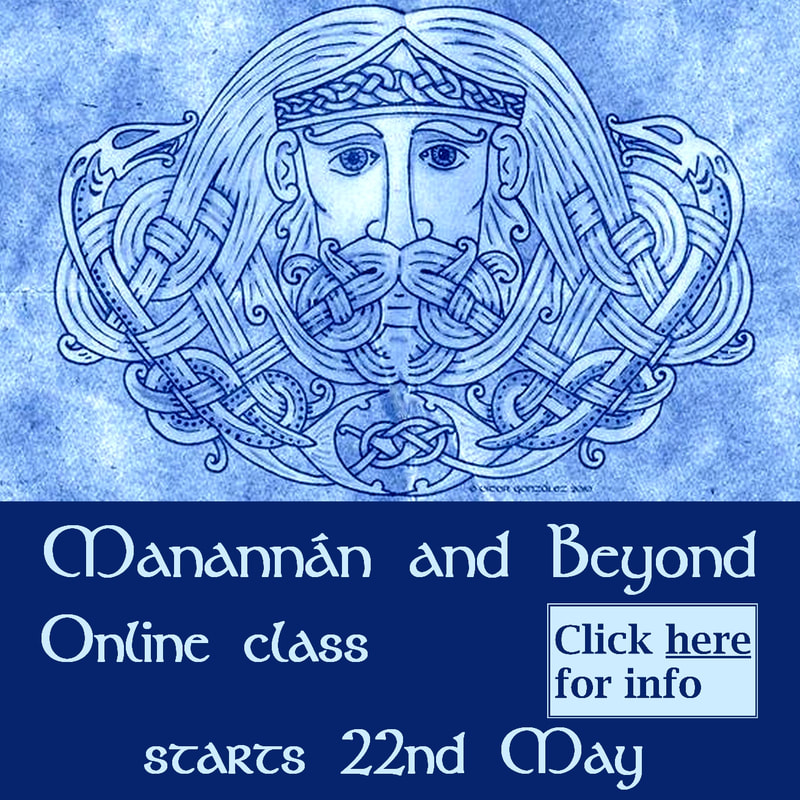Gwyddno Garanhir (Gwyddno ‘longshanks’) is best known as the lord of the legendary drowned kingdom which is supposedly under Cardigan Bay. There is real evidence of an inundation, perhaps 4,500 years ago. Medieval maps show islands no longer visible, while in recent years, heavy storms have revealed more and more petrified forests along the coast, visible at low tides. Perhaps a very long folk memory has made its contribution to the legend of Gwyddno, who would understandably need a good pair of wading legs.
Gwyddno belongs to legend, now, and it is difficult to place him with certainty in a historical period. The 6th century seems likely, but that’s a little late for the inundation. A conflation of famous Gwyddnos could be at work. There are a number of Gwyddnos in the 6th century who are difficult to disambiguate, although Peter Bartrum offers some help in A Welsh Classical Dictionary (p 392-396).
Gwyddno Garanhir’s first literary appearance is in the 13th century Black Book of Carmarthen, where he has a conversation with Gwyn ap Nudd, in which Gwyn is very much in his psychopompic persona. His main legend also appears in the Black Book, as a lament in Gwyddno’s voice for the loss of his land – Cantre’r Gwaelod (the bottom cantref). Medieval poets and 20th century Celticists have all contributed interpretations of the material. Over time, it has been suggested both that the woman Meirerid, mentioned in the poem, made a mistake with a well (perhaps reminiscent of Boand in Irish lore), or that the flood was the result of drunkenness on the part of either Gwyddno, himself, or a prince called Seithenyn. (Bartrum p 394-396)
Gwyddno is also the father of a prince called Elphin, who had the luck to find the infant Taliesin (sewn up by Cerridwen in a leather bag forty years earlier) caught in his father’s fish weir. Some versions of the tale of Taliesin and Cerridwen mention how Gwyddno’s horses were poisoned when Cerridwen’s cauldron burst and its poisonous contents flowed into a river. Much of the story of Taliesin is devoted to telling how he later rescued Elphin from his poverty and from the anger of King Maelgwn. [1] Gwyddno’s final claim to fame is his possession of a hamper, mentioned in Culhwch and Olwen. Gwyddno’s hamper is capable of feeding a hundred men, if food for just one is put into it.
If you don’t mind Victorian English, you might enjoy Peacock’s book. His satiric wit is mostly aimed at the drunken Seithenyn, and various self-important members of the nobility and clergy. So far, so good. Of course, like any good historical/mythological novelist, he also feels duty bound to create a love interest for the young Taliesin, and to pad the story out with sometimes interminable conversations between said nobles and clergy, which allow him to exercise that witty turn of phrase. At first, I found that aspect quite funny, but by the end it had begun to grate and I was tempted to skip forward.
Then there’s the verse. I happen to like Victorian poetry a lot. (Alfred Tennyson was one of my ‘gateway drugs’ to neoPaganism, believe it or not.) Technically, Peacock’s verse is excellent in its rhyme and metre. But, even though much of it describes nature, it left me cold. Perhaps Peacock’s cynical satirist’s mind made it difficult for him to feel nature on a deep level. It's as if he imitates other poets’ descriptions of nature without quite understanding why they say what they say.
The penultimate chapter of the book features a bardic contest in which Taliesin competes against other famous early Welsh bards. Myrddin, Aneirin, and Llywarch Hen are all present. When I hit that chapter and saw what Peacock was about to do, I definitely sat up and took notice. Good English translations of these works were not readily available in Peacock’s time, and exactly how he accessed the material isn’t clear. Did his wife translate for him, or did someone else? Did he attempt to read the Welsh? My guess is that someone merely provided him with a synopsis of some of the work of these poets, and perhaps translated a few lines as examples.
Now, to be clear, Peacock never claims his poems to be translations, or even paraphrases, of the work of Taliesin or these other great bards. However, this was the chapter in which I really lost respect for the book. Into the mouth of Llwyarch Hen, Peacock puts his unemotional and flabby verses about the beauty of winter. He completely misses the desolation and despair of the original gnomic verses, but sticks to the subject matter, after a fashion. Myrddin talks about how nice apple trees are and Aneirin offers a long and rousing poem about warriors. None of it makes the reader feel anything, completely missing the power of the original poets. Of course, the poetry of Peacock’s Taliesin is filled with his own sharp wit, but it lacks the seemingly heartfelt praise of his patrons found in the historical Taliesin, or the sharp-edged, psychedelic shape-shifting of the legendary Taliesin.
In the end, I have the same problem with this book that I have with every historical-cum-fantasy novel based on Celtic myth or legend. The authors are almost always from outside the relevant cultures, and are basically co-opting those cultures as a vehicle for the story they want to tell, and they want to give that story a coat of Celtic paint.
The Misfortunes of Elphin is in the public domain. My copy was published by the Dodo Press (undated). It is also available online and in historical reprints.
[1] These stories of Taliesin are translated in Patrick Ford’s The Mabinogi and other Medieval Welsh Tales. University of California Press.


 RSS Feed
RSS Feed




